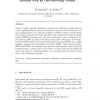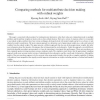5122 search results - page 50 / 1025 » Comparing Consequence Relations |
109
Voted
JLP
2008
15 years 2 months ago
2008
models, used for specification, analysis and verification, usually describe sets of implementations by means of a refinement relation. In the branching time setting, implementatio...
116
Voted
COLING
2002
15 years 2 months ago
2002
We present a comparative evaluation of two data-driven models used in translation selection of English-Korean machine translation. Latent semantic analysis(LSA) and probabilistic ...
115
Voted
COR
2008
15 years 2 months ago
2008
This paper is concerned with procedures for ranking discrete alternatives when their values are evaluated precisely on multiple attributes and the attribute weights are known only...
177
Voted
CVIU
2011
14 years 6 months ago
2011
Abstract—In this paper, three approaches to utilizing objectlevel spatial contextual information for semantic image analysis are presented and comparatively evaluated. Contextual...
280
Voted
ICDE
2005
IEEE
16 years 4 months ago
2005
IEEE
We study several transparent techniques for scaling dynamic content web sites, and we evaluate their relative impact when used in combination. Full transparency implies strong dat...


